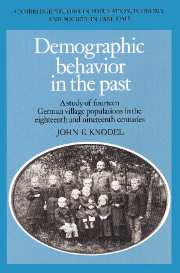 Demographic Behavior in the Past
Demographic Behavior in the Past Book contents
- Frontmatter
- Contents
- List of tables
- List of figures
- Acknowledgements
- PART I INTRODUCTION
- PART II MORTALITY
- PART III FAMILY FORMATION
- 6 Marriage
- 7 Marital dissolution and remarriage
- 8 Illegitimacy
- 9 Bridal pregnancy and prenuptial births
- PART IV MARITAL REPRODUCTION
- PART V INTERRELATIONSHIPS IN DEMOGRAPHIC BEHAVIOR
- PART VI CONCLUSION
- Appendices
- Bibliography
- Index
- Frontmatter
- Contents
- List of tables
- List of figures
- Acknowledgements
- PART I INTRODUCTION
- PART II MORTALITY
- PART III FAMILY FORMATION
- 6 Marriage
- 7 Marital dissolution and remarriage
- 8 Illegitimacy
- 9 Bridal pregnancy and prenuptial births
- PART IV MARITAL REPRODUCTION
- PART V INTERRELATIONSHIPS IN DEMOGRAPHIC BEHAVIOR
- PART VI CONCLUSION
- Appendices
- Bibliography
- Index
Summary
In Germany, as indeed throughout most of Europe, the vast majority of reproductive behavior during the eighteenth and nineteenth centuries took place within the confines of marital unions as formally defined by the Church and the legal system. The discouragement of extramarital fertility was critical for the western European preindustrial demographic system, in which nuptiality was the principal mechanism through which a precarious balance between population and local resources was achieved. Nevertheless, virtually nowhere was the suppression of births out of wedlock complete, and in some areas and during some periods non-marital fertility made more than a trivial contribution to overall fertility levels. Moreover, while marriage often marked the beginning of a couple's reproductive career, this was by no means always the case. Prenuptial births to couples who subsequently married were not unusual, and even when a couple's first birth was postnuptial, a prenuptial conception often preceded, and in some cases may have precipitated, the marriage itself.
Births born or conceived out of wedlock are of concern not only for their demographic significance but also for what they imply about social life in the past. Their impact on the lives of the parents and children directly involved, as well as on the community at large, is a matter of historical interest. Moreover, they can serve as an imperfect indicator of premarital and extramarital sexual activity.
- Type
- Chapter
- Information
- Demographic Behavior in the PastA Study of Fourteen German Village Populations in the Eighteenth and Nineteenth Centuries, pp. 185 - 208Publisher: Cambridge University PressPrint publication year: 1988
